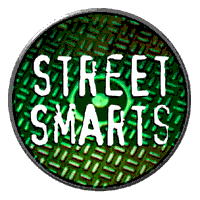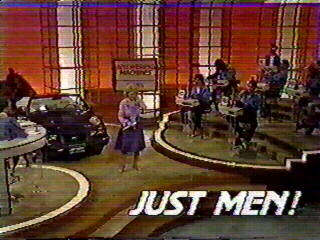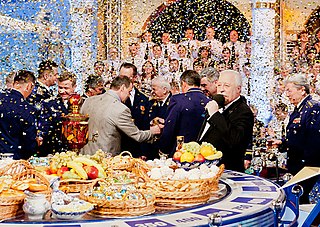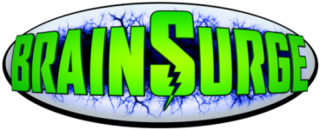
Eye Guess was an American game show created by Bob Stewart and hosted by Bill Cullen, which aired on NBC from January 3, 1966, to September 26, 1969. The game combined a general knowledge quiz with a Concentration-style memory element, where the answers were shown to the players and their recall of their positions was tested.
The Joker's Wild is an American television game show that aired at different times between 1972 and 2019. In the show, contestants answer questions based on categories determined randomly by a mechanism resembling a slot machine. The show's title refers to the game's slot-machine mechanism also having jokers.

Street Smarts is an American game show that featured two in-studio contestants trying to predict the outcome of interviews of people who were found on the street. The show, which was hosted by Frank Nicotero, aired in syndication from 2000 to 2005.

Celebrity Squares is a British comedy game show based on the American comedy game show Hollywood Squares. It first ran from 20 July 1975 to 7 July 1979 and was hosted by Bob Monkhouse, then—also hosted by Monkhouse—from 8 January 1993 to 3 January 1997.
Time Machine is an American game show where contestants compete to answer trivia questions about popular culture and recent history to win prizes. The show aired on NBC from January 7 through April 26, 1985, and was hosted by John Davidson. Charlie Tuna was the announcer, with Rich Jeffries as his substitute. Reg Grundy Productions produced the series, and upon its premiere Time Machine was one of three Grundy series airing on NBC.
itbox is a networked gambling games terminal which is found in thousands of pubs, leisure centres and amusement arcades in the United Kingdom. Classified as a "skill with prize" (SWP) machine, each itbox terminal typically includes 25 different games. Each game costs 50p or £1 to play and lasts between 10 seconds and several minutes. From most of these games it is possible to win modest cash prizes. Although strictly the name 'itbox' refers only to Leisure Link-made terminals, the name is often casually applied as a genericized trademark to other SWP terminals such as Paragon SWP, Gamesnet, ind:e and Fatbox.
Click is an American television game show based around computers and the then-relatively novel medium of the Internet. The youth-oriented series was created by Merv Griffin and hosted by Ryan Seacrest, with a female co-host who also served as announcer: Amber Bonasso in Season 1, and Amber Willenborg in Season 2.

Just Men! is an American game show that aired on NBC Daytime from January 3 to April 1, 1983. The show starred Betty White, who won an Emmy award for her work on the show, with Steve Day announcing. It pitted two female contestants who were asked to predict answers to questions posed previously to a panel of seven male celebrities.

Miljoenenjacht, officially Postcode Loterij Miljoenenjacht, is a Dutch game show, sponsored by the country's postcode lottery, where a contestant and at-home viewer could win up to €5,000,000 or as little as €0.01. The show is broadcast at various times, spanning across six episodes for each set. The program was originally shown by TROS on NPO 2, but moved to creator John de Mol's channel Tien in 2005. After the channel was discontinued after its sale to the RTL Group, the program moved to RTL 4. In 2019, the program moved to SBS6 due to the transfer of Linda de Mol from RTL to SBS.
WinTuition is an American game show created as an original series for Game Show Network, on which it originally ran from December 9, 2002 to April 1, 2003. The game had a school-oriented theme in which three contestants competed to answer questions on general school-based subjects in an attempt to win a $50,000 college fund, hence the name of the show. The show was hosted by Marc Summers and announced by Burton Richardson. Henry Winkler served as the show's executive producer.
Sale of the Century is an Australian game show that aired on the Nine Network from 14 July 1980 to 29 November 2001. It is based on both Great Temptation that aired from 1970 to 1974 and on the original Sale that first aired in the United States from 1969 to 1973. The Australian format of Sale has since been used internationally, including in a revived US version that aired from 1983 to 1989.

Pole Chudes is a Russian adaptation of the U.S. game show Wheel of Fortune produced by VID, provided with elements of Russian culture and hosted by Leonid Yakubovich. The current rating of the show suggests it is intended for ages 16 and above, unlike the American version which is suitable for all age groups. Channel One Russia currently intends to stop buying Pole Chudes from VID and replace it with a licensed version of Wheel of Fortune under the same name since January 2022. Originally, due to a trademark dispute with VID, the title of the new show was supposed to be Nashe Pole Chudes, however, VID later agreed to let Channel One keep the original Pole Chudes name and the full 31-year archive, while Channel One will be producing the new reboot of the show as a licensed spin-off of Wheel of Fortune.

Wheel of Fortune is a British television game show based on the American show of the same name created by Merv Griffin. Contestants compete to solve word puzzles, similar to those used in Hangman, to win cash and prizes. The title refers to the show's giant carnival wheel that contestants spin throughout the course of the game to determine their cash and/or prizes.

Uh Oh! is a Canadian television game show that was created by Rick Watts and Frank Young. Following a sneak preview at YTV Psykoblast on August 16, Uh Oh! aired from August 22, 1997 to April 19, 2003 on YTV, and was a spin-off of the popular variety show It's Alive!, which also aired on YTV. Uh Oh! was part of It's Alive's game show segment during its third season, but existed as a parody during its second season. As of 2023, Uh Oh! is the third longest-running show on YTV, behind Hit List and Video & Arcade Top 10, both of which aired for 14 and 15 years respectively. For its entire run, Uh Oh! was taped at Global Television in Toronto, Ontario. The series ended on April 19, 2003.

Break the Bank is a game show created by Richard S. Kline. It aired in syndication from September 16, 1985 to June 20, 1986, with repeats airing until September 12. It was not related to two previous shows by the same name.
La ruleta de la fortuna or La ruleta de la suerte is the Spanish version of Wheel of Fortune. The first incarnation ran from 1990 to 1992 in Antena 3, the second one from 1993 to 1997 in Telecinco, and then, after a 9 year hiatus, a revival has been made on Antena 3 beginning in 2006. The show also airs internationally via Antena 3 Internacional.

Bingo America is an American game show broadcast by Game Show Network. The series follows two contestants as they try to compete to win up to $100,000. Additionally, the series lets at-home viewers print bingo cards online that allow them to play along with the show to win small amounts of money for themselves.
On the Spot is an American game show produced by and broadcast on KGW-TV in Portland, Oregon as a daily series from September 1984 to October 1988. Newscaster Larry Blackmar was host, while local disc-jockey Michael Bailey announced.

BrainSurge is an American children's game show that aired on Nickelodeon and was hosted by Jeff Sutphen. The show taped its first season in February 2009, and debuted on September 28, 2009. The show's format was adapted from the Japanese game show Brain Survivor. The U.S. version was created by Scott A. Stone, co-creator of Legends of the Hidden Temple, and Clay Newbill, executive producer of The Mole.
Family Game Night was an American television game show based on Hasbro's family of board games and EA's video game franchise of the same name. The show was hosted by Todd Newton. Burton Richardson was the announcer for the first two seasons; he was replaced by Stacey J. Aswad in the third season, and Andrew Kishino was hired for the fourth season. The 60-minute program debuted on October 10, 2010, on The Hub which was Discovery Kids. The network became Discovery Family on October 13, 2014; it was previewed on October 9, 2010, on its sister channel, TLC. Seasons 1 and 2 each contained 26(1) and 30(2) episodes. Seasons 3, 4 and 5 each contained 15 episodes. Season 2 premiered on Friday, September 2, 2011, with additional games being added. The games added to the second season included Cranium Brain Breaks, Green Scream, Ratuki Go-Round, Simon Flash, Operation Sam Dunk, Trouble Pop Quiz, and Spelling Bee. However games from the previous season were still kept.










